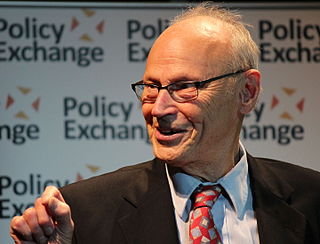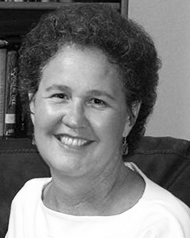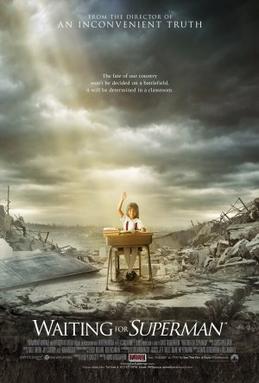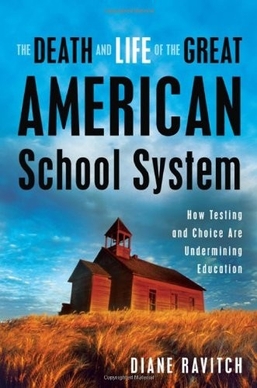Education reform is the name given to the goal of changing public education. The meaning and education methods have changed through debates over what content or experiences result in an educated individual or an educated society. Historically, the motivations for reform have not reflected the current needs of society. A consistent theme of reform includes the idea that large systematic changes to educational standards will produce social returns in citizens' health, wealth, and well-being.

Charter schools in the United States are primary or secondary education institutions that are public schools which are publicly funded and operate independently, rather than being overseen by local school districts. Charter schools have a contract with local school districts or other authorizing bodies that allow them to operate. These contracts, or charters, are how charter schools bear their name. They are funded with public tax dollars, though they also fundraise independently. Charter schools are subject to fewer rules than traditional state schools in exchange for greater accountability. Proponents argue that they are meant to serve underserved communities that wish to have alternatives to their neighborhood school. Charters are run as either non-profit or for-profit institutions. However, there are some for-profit management organizations that hold charters, though these are only allowed in Arizona. Only non-profit charters can receive donations from private sources, just the same as traditional public schools.

In education, a curriculum is broadly defined as the totality of student experiences that occur in the educational process. The term often refers specifically to a planned sequence of instruction, or to a view of the student's experiences in terms of the educator's or school's instructional goals. A curriculum may incorporate the planned interaction of pupils with instructional content, materials, resources, and processes for evaluating the attainment of educational objectives. Curricula are split into several categories: the explicit, the implicit, the excluded, and the extracurricular.

Deborah Meier is an American educator often considered the founder of the modern small schools movement. After spending several years as a kindergarten teacher in Chicago, Philadelphia and then New York City, in 1974, Meier became the founder and director of the alternative Central Park East school, which embraced progressive ideals in the tradition of John Dewey in an effort to provide better education for children in East Harlem, within the New York City public school system.

Eric "E. D." Donald Hirsch Jr. is an American educator, literary critic, and theorist of education. He is professor emeritus of humanities at the University of Virginia.

Linda Darling-Hammond is an American academic who is the Charles E. Ducommun Professor of Education Emeritus at the Stanford Graduate School of Education. She was also the President and CEO of the Learning Policy Institute. She is author or editor of more than 25 books and more than 500 articles on education policy and practice. Her work focuses on school restructuring, teacher education, and educational equity. She was education advisor to Barack Obama's 2008 presidential campaign and was reportedly among candidates for United States Secretary of Education in the Obama administration.
Sandra Stotsky is Professor emerita in the Department of Education Reform at the University of Arkansas, and held the 21st Century Chair in Teacher Quality. Her research ranges from teacher licensure tests, e.g., (1), coherence in the literature and reading curriculum, e.g., (2), and academic achievement in single-sex classrooms, e.g., (3) to critiques of Common Core’s standards in English language arts, e.g., (4) mathematics.(5), and US History and civic education (6), and other aspects of the Common Core project, e.g., (7), and to reviews of books in education, e.g., (8) She is an advocate of standards-based reform and strong academic standards and assessments for students and teachers.

A Nation at Risk: The Imperative for Educational Reform is the 1983 report of the United States National Commission on Excellence in Education. Its publication is considered a landmark event in modern American educational history. Among other things, the report contributed to the ever-growing assertion that American schools were failing, and it touched off a wave of local, state, and federal reform efforts.

The history of education in the United States covers the trends in formal educational in America from the 17th century to the early 21st century.
Chester Evans "Checker" Finn Jr. is a former professor of education, an educational policy analyst, and a former United States Assistant Secretary of Education. He is currently the president emeritus of the nonprofit Thomas B. Fordham Foundation in Washington, D.C. He is also a Fellow of the International Academy of Education, an Adjunct Fellow at the Hudson Institute, and a senior fellow at Stanford University's Hoover Institution where he chairs the Koret Task Force on K-12 Education. He was also a member of the Maryland Kirwan Commission on Education during its authorization period from 2016 to 2019.

Michelle Ann Rhee is an American educator and advocate for education reform. She was Chancellor of District of Columbia Public Schools from 2007 to 2010. In late 2010, she founded StudentsFirst, a non-profit organization that works on education reform.
Susan Harriet Fuhrman is an American education policy scholar and served from 2006 as the first female president of Teachers College, Columbia University. Fuhrman earned her doctorate in Political Science and Education from Columbia University. She became very engaged in issues of educational equity and emerged as an authority on school reform. Fuhrman is known for her early and ongoing critical analysis of the standards movement and for her efforts to foster research that provides a scientific basis for effective teaching.
Race to the Top was a $4.35 billion United States Department of Education competitive grant created to spur and reward innovation and reforms in state and local district K–12 education. Funded as part of the American Recovery and Reinvestment Act of 2009, it was announced by President Barack Obama and Secretary of Education Arne Duncan on July 24, 2009. States competing for the grants were awarded points for enacting certain educational policies, instituting performance-based evaluations for teachers and principals based on multiple measures of educator effectiveness, adopting common standards, adopting policies that did not prohibit the expansion of high-quality charter schools, turning around the lowest-performing schools, and building and using data systems.

Waiting for "Superman" is a 2010 American documentary film written and directed by Davis Guggenheim and produced by Lesley Chilcott. The film criticizes the American public education system by following several students as they strive to be accepted into competitive charter schools such as KIPP LA Schools, Harlem Success Academy and Summit Preparatory Charter High School.
The Common Core State Standards Initiative, also known as simply Common Core, is an educational initiative from 2010 that details what K–12 students throughout the United States should know in English language arts and mathematics at the conclusion of each school grade. The initiative is sponsored by the National Governors Association and Council of Chief State School Officers.

Deborah Kenny is an American educator, author of Born to Rise and the founder and Chief Executive of Harlem Village Academies, a network of charter schools in Harlem, New York.

Frederick M. Hess is an American educator, political scientist, and author. He is a resident fellow and director of education policy studies at the American Enterprise Institute. In addition to his blog "Rick Hess Straight Up" at Education Week, he is also a senior contributor to Forbes, and executive editor of Education Next. His books include Spinning Wheels, Letters to a Young Education Reformer, Cage-Busting Leadership, A Search for Common Ground, and The Great School Rethink.
Eva Sarah Moskowitz is an American politician and education reform leader, who is the founder and CEO of the Success Academy Charter Schools. A member of the Democratic Party, Moskowitz served on the New York City Council, representing the 4th district on the Upper East Side, from 1999 to 2005. Moskowitz interviewed to be Donald Trump's Secretary of Education, but decided not to pursue the position.

The Death and Life of the Great American School System: How Testing and Choice Are Undermining Education is a non-fiction book by Diane Ravitch, originally published in 2010 by Basic Books, with revised and expanded versions reprinted over the years.
The History of Education in New York City covers schools and schooling from the colonial era to the 1960s. It includes public and private schools, as well as higher education. Annual city spending on public schools quadrupled from $250 million in 1946 to $1.1 billion in 1960. It reached $38 billion in 2022, or $38,000 per public school student. For recent history see Education in New York City.













